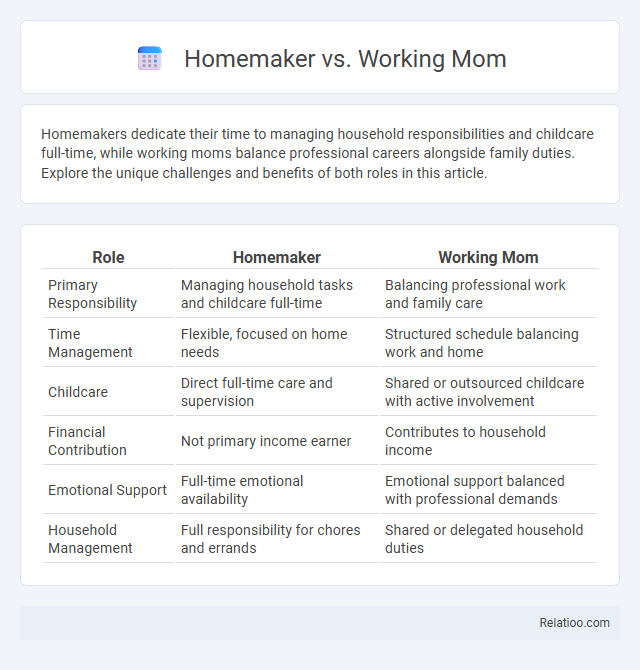Homemakers dedicate their time to managing household responsibilities and childcare full-time, while working moms balance professional careers alongside family duties. Explore the unique challenges and benefits of both roles in this article.
Table of Comparison
| Role | Homemaker | Working Mom |
|---|---|---|
| Primary Responsibility | Managing household tasks and childcare full-time | Balancing professional work and family care |
| Time Management | Flexible, focused on home needs | Structured schedule balancing work and home |
| Childcare | Direct full-time care and supervision | Shared or outsourced childcare with active involvement |
| Financial Contribution | Not primary income earner | Contributes to household income |
| Emotional Support | Full-time emotional availability | Emotional support balanced with professional demands |
| Household Management | Full responsibility for chores and errands | Shared or delegated household duties |
Introduction: Defining Homemakers and Working Moms
Homemakers primarily manage household responsibilities and caregiving duties, creating a supportive home environment without formal employment outside the home. Working moms balance professional careers with daily childcare and household tasks, often facing unique challenges in time management and work-life integration. Understanding the distinct roles and contributions of homemakers and working moms is essential for appreciating diverse family dynamics and societal expectations.
Historical Perspective on Motherhood Roles
Motherhood roles have evolved significantly, with historical norms labeling homemakers as the primary caregivers focused on domestic duties. The rise of working moms during the 20th century marked a shift influenced by industrialization, feminist movements, and economic necessity, challenging traditional family dynamics. Despite these changes, the homemaker role remains culturally significant, reflecting enduring values around childcare and household management.
Key Differences: Daily Routines and Responsibilities
Homemakers primarily focus on managing household tasks such as cleaning, cooking, childcare, and organizing family schedules, often without external employment obligations. Working moms balance professional responsibilities with family duties, managing time between career demands and parenting, often relying on support systems like childcare or flexible work arrangements. Time management and task prioritization differ significantly, with homemakers dedicating full days to home upkeep, while working moms divide attention between job-related tasks and household needs.
Emotional Well-being: Stress and Fulfillment
Homemakers often report lower workplace-related stress but may face challenges in finding personal fulfillment beyond domestic roles, impacting emotional well-being differently than working moms. Working moms experience higher stress levels due to balancing professional responsibilities and family demands, yet many find greater fulfillment through career achievements and personal growth. Emotional well-being fluctuates based on individual coping strategies, social support, and role satisfaction in both homemaker and working mom contexts.
Impact on Children’s Development
Children of working moms often develop strong independence and time-management skills due to observing their mother's multitasking abilities and work-life balance. Homemaker moms typically provide children with consistent emotional support and supervision, fostering secure attachments and stability. The impact on children's development varies depending on quality of interaction, emotional availability, and support rather than solely on whether the mother works or stays at home.
Financial Considerations: Income and Household Economy
Comparing Homemaker vs Working Mom reveals significant financial considerations impacting household income and economy. Your choice affects not only the direct income generation but also influences expenses related to childcare, commuting, and job-related costs, shaping the overall household budget. Balancing these factors is crucial for optimizing financial stability and long-term economic planning within the family.
Work-Life Balance Challenges
Homemakers often face challenges in maintaining personal identity and financial independence while managing household responsibilities, whereas working moms struggle to balance demanding careers with childcare and family duties, leading to high levels of stress and burnout. The work-life balance for working moms is further complicated by societal expectations and limited support systems, impacting mental health and career progression. Homemakers transitioning to the workforce encounter difficulties in skill gaps and time management, highlighting the need for flexible workplace policies and accessible childcare solutions.
Societal Perceptions and Stigma
Societal perceptions of homemakers often include stereotypes of dependency and lack of ambition, whereas working moms face scrutiny over balancing career and family responsibilities, sometimes being judged as neglectful or overextended. Homemakers who later re-enter the workforce encounter stigma related to skill obsolescence and professional dedication. These contrasting views reflect deeply ingrained cultural expectations of gender roles and productivity, influencing social support and personal identity.
Personal Growth and Career Opportunities
Balancing personal growth and career opportunities varies significantly between homemakers and working moms, with working moms often navigating both professional advancement and family responsibilities simultaneously. Homemakers may experience personal growth through managing household duties and family dynamics but might face limited external career opportunities compared to working moms. Your choice between these roles impacts not only daily routines but also long-term development and career trajectory, highlighting the importance of aligning your priorities with personal and professional goals.
Choosing What’s Right: Factors to Consider
Choosing what's right between being a homemaker, working mom, or combining both roles depends on your personal priorities, financial needs, and family dynamics. Consider factors such as childcare availability, career goals, mental health, and the support system around you to make the best decision for your household. Balancing responsibilities effectively requires assessing your values and the impact of each choice on your family's well-being.

Infographic: Homemaker vs Working Mom
 relatioo.com
relatioo.com